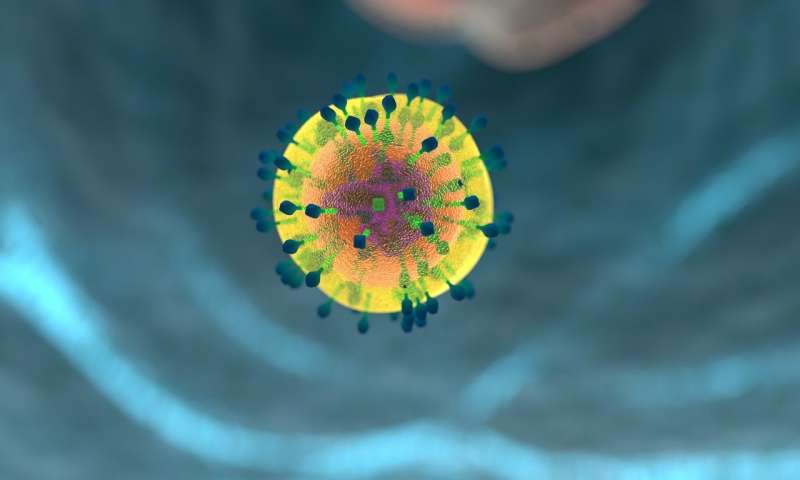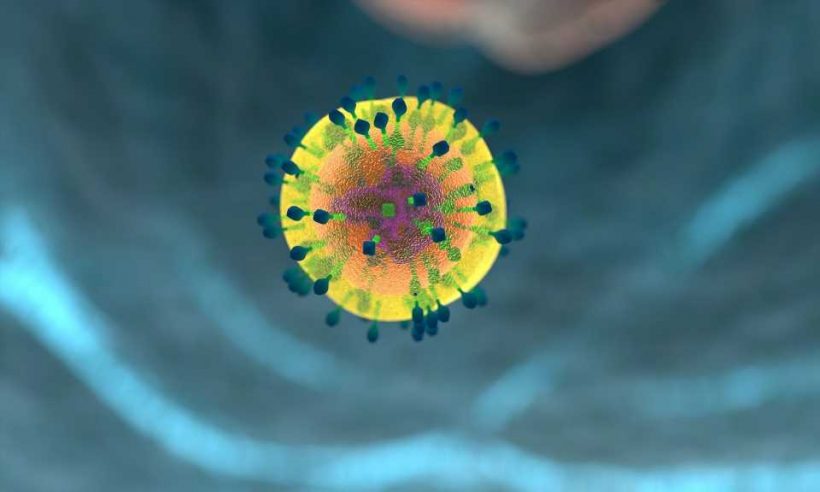
Cancer immunotherapy drugs called PD-1 inhibitors are widely used to stimulate the immune system to fight cancer, but many patients either don’t respond or develop resistance to them. A new small-molecule drug candidate being tested in an early-stage clinical trial aims to improve patient responses to immunotherapy.
Now scientists have shown, in a study published in Nature, that the small molecule works through two different mechanisms to slow tumor growth and increase survival in lab animals.
Researchers from the Tumor Immunotherapy Discovery Engine (TIDE) at the Broad Institute of MIT and Harvard, AbbVie, and Calico Life Sciences report that the molecule simultaneously makes tumors more sensitive to immune attack and boosts the activity of immune cells to fight tumors in mice.
The molecule works by blocking the PTPN2 and PTPN1 proteins, which normally act to shut down the ability of cells to sense signals that activate immune cells. The researchers found that by inhibiting PTPN2/N1, the molecule turns immune cells called T and NK cells into more effective killers of tumor cells and also makes tumor cells more vulnerable to attack. Blocking PTPN2/N1 also helps reduce T-cell exhaustion, a type of T-cell dysfunction that is thought to underlie some cancer immunotherapy resistance.
The molecule’s dual mechanism of action—targeting both tumor and immune cells—is unique compared to other cancer immunotherapies including PD-1 drugs, and the researchers think it could explain why the molecule was so effective on its own in animal models and may not even need to be used in combination with other drugs such as anti-PD-1 therapy.
AbbVie and Calico discovered the molecule, called ABBV-CLS-484, after TIDE researchers at Broad identified the PTPN2 gene as a promising cancer immunotherapy target in 2017. AbbVie and Calico are currently testing the molecule and another related molecule, also developed by AbbVie and Calico, in phase 1 clinical trials.
“This is an unprecedented opportunity to evaluate how immune responses work,” said Robert Manguso, who is co-senior author on the study, an associate member at the Broad, and an assistant professor at the Massachusetts General Hospital Center for Cancer Research and Harvard Medical School. “The ability to further explore this signaling pathway in clinical studies is really important.”
Manguso and Kathleen Yates at the Broad co-direct TIDE, which uses CRISPR screens and other tools in animals to systematically uncover genes such as PTPN2 that cancers use to evade immunotherapy. Hakimeh Ebrahimi-Nik, a senior research scientist in TIDE, and Christina Baumgartner, a senior principal research scientist at AbbVie, were co-first authors on the study.
In addition to Manguso and Yates, Jennifer Frost, a research fellow at AbbVie, and Philip Kym, vice president of Global Medicinal Chemistry at AbbVie, co-led the study in collaboration with scientists at Calico.
“It still sort of stuns me that we went from discovering a target in 2017 to testing drugs in patients starting in 2020,” Yates said. “The ability to leverage these partnerships, resources, technology like CRISPR, and AbbVie’s medicinal chemistry—it’s just been this confluence of factors that has felt like a fast-forward button.”
“Discovering a mechanism that has the potential to make a difference in someone’s life is one of the most exciting and rewarding parts about being a drug discovery scientist,” Baumgartner said. “We work every day with a sense of urgency and dedication knowing that patients are waiting. By collaborating with our partners at Calico and the Broad, we were able to quickly discover, characterize, and develop these innovative molecules.”
“The challenge of identifying orally bioavailable small molecule therapeutics targeting the active site of a phosphatase drug class was significant. In fact, previous work across the pharmaceutical industry targeting active site phosphatase inhibitors was unsuccessful, leading to the general conclusion that this was an ‘undruggable’ target class,” added Kym. “Therefore, it was very exciting to see the collaborative work of the combined discovery team be successful in delivering this first-in-class clinical candidate.”
“This three-way collaboration among Calico, the Broad Institute, and AbbVie demonstrates the power of combining the best features of academia with the best of industry to accelerate scientific advances—in this case, translating early biology and target discovery into a clinical compound that is the first known active site phosphatase inhibitor of any kind,” said Marcia Paddock, co-author and director of oncology new target development at Calico.
Keeping cancer in check
In 2017, in an experiment that would become the foundation of TIDE, Manguso and researchers including W. Nicholas Haining (then at the Dana-Farber Cancer Institute and now at Arsenal Bio) systematically combed through almost 2,400 cancer genes in mice, looking for those that made melanoma tumors more or less sensitive to treatment with PD-1 inhibitors. They homed in on the PTPN2 gene and found that deleting it made tumor cells strikingly more sensitive to anti-PD-1 therapy.
But Manguso and Yates had another reason to be hopeful: PTPN2 is highly expressed in T cells, and previous research had shown that deleting it helped activate those cells, which could improve their ability to keep tumors in check. PTPN2 and a closely related gene called PTPN1 both encode phosphatases that inhibit signaling in an important immune pathway called JAK-STAT.
However, drug companies had historically struggled to make inhibitors that bind to the active site of these phosphatases because they have a strong electric charge. This means that drugs that bind to them must also be highly charged, making it difficult for them to cross the cell membrane and enter the cell.
“There was evidence in the literature that this was going to be very difficult, but AbbVie just tackled the problem in a pretty fearless way,” Manguso said. “That culture of optimism was really important for the project’s eventual success.”
AbbVie scientists succeeded in designing a small molecule that enters the cell and binds to the PTPN2 and PTPN1 phosphatases, and the team then tested the molecule in tumor-bearing mice. Animals treated with the molecule showed slower tumor growth and survived longer than untreated animals, suggesting that ABBV-CLS-484 may work on its own, unlike many other emerging immunotherapies.
The team also found that mice treated with both the molecule and an anti-PD-1 drug showed an even greater benefit, suggesting that the molecule may work in combination with other immunotherapies in patients.
Orchestrating efficacy
Led by Ebrahimi-Nik at the Broad and Baumgartner at AbbVie, together with scientists at Calico, the researchers uncovered the mechanism of action that may explain why the drug is so potent in lab animals. They found that inhibiting PTPN2 and PTPN1 in tumor cells made the cells more susceptible to certain cell-killing signals produced by immune cells, and also made cancer-fighting NK and T cells more active in tumors in animals and in human blood samples.
Moreover, ABBV-CLS-484 appeared to reduce T-cell exhaustion. T cells treated with the molecule kept functioning and dividing, helping to control cancer growth even in settings where T cells typically struggle, such as in tumors that don’t have significant infiltration of immune cells, or that have spread elsewhere in the body.
The researchers showed that ABBV-CLS-484 causes an increase in JAK-STAT signaling that may help keep T cells active and prevent their exhaustion. Ebrahimi-Nik says this strong effect on T cells hasn’t been observed in other immunotherapies, including anti-PD-1 drugs.
“When we treat animals with our inhibitor, we observe a specific cluster of CD8+ T cells in the tumor that are more active—they are more effective, more proliferative, and less exhausted,” she said. “We were really impressed by that.”
TIDE researchers are now working with scientists from AbbVie, Calico, and other teams to design a new phase of clinical trials and identify markers of patient response to ABBV-CLS-484.
“Removing the inhibition of JAK-STAT signaling in these T cells is making them extremely effective warriors at the frontline, and is also significantly reducing T-cell exhaustion,” Yates said. “To our knowledge, no one has observed that with a small molecule immunotherapy before. And we are incredibly excited to understand how this can improve responses in patients.”
More information:
Baumgartner CK, Ebrahimi-Nik H, et al, PTPN2/N1 inhibitor ABBV-CLS-484 unleashes potent anti-tumor immunity, Nature (2023). DOI: 10.1038/s41586-023-06575-7 , www.nature.com/articles/s41586-023-06575-7
Journal information:
Nature
Source: Read Full Article






